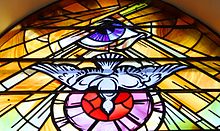
Omnipotence

Omnipotence is the quality of having unlimited power. Monotheistic religions generally attribute omnipotence to only the deity of their faith. In the monotheistic philosophies of Abrahamic religions, omnipotence is often listed as one of a deity's characteristics among many, including omniscience, omnipresence, and omnibenevolence. The presence of all these properties in a single entity has given rise to considerable theological debate, prominently including the problem of theodicy, the question of why such a deity would permit the manifestation of evil.It is sometimes objected that this aspect of omnipotence involves the contradiction that God cannot do all that He can do; but the argument is sophistical; it is no contradiction to assert that God can realize whatever is possible, but that no number of actualized possibilities exhausts His power. Omnipotence is perfect power, free from all mere potentiality. Hence, although God does not bring into external being all that He is able to accomplish, His power must not be understood as passing through successive stages before its effect is accomplished. The activity of God is simple and eternal, without evolution or change. The transition from possibility to actuality or from act to potentiality, occurs only in creatures. When it is said that God can or could do a thing, the terms are not to be understood in the sense in which they are applied to created causes, but as conveying the idea of a Being, the range of Whose activity is limited only by His sovereign WillPower is predicated of God not as something really distinct from His knowledge and will, but as differing from them logically; inasmuch as power implies a notion of a principle putting into execution what the will commands, and what knowledge directs, which three things in God are identified. Or we may say, that the knowledge or will of God, according as it is the effective principle, has the notion of power contained in it. Hence the consideration of the knowledge and will of God precedes the consideration of His power, as the cause precedes the operation and effect.His Omnipotence means power to do all that is intrinsically possible, not to do the intrinsically impossible. You may attribute miracles to him, but not nonsense. This is no limit to his power. If you choose to say 'God can give a creature free will and at the same time withhold free will from it,' you have not succeeded in saying anything about God: meaningless combinations of words do not suddenly acquire meaning simply because we prefix to them the two other words 'God can.'... It is no more possible for God than for the weakest of his creatures to carry out both of two mutually exclusive alternatives; not because his power meets an obstacle, but because nonsense remains nonsense even when we talk it about God.My notion would be, that anything which possesses any sort of power to affect another, or to be affected by another, if only for a single moment, however trifling the cause and however slight theeffect, has real existence; and I hold that the definition of being is simply power.Power is influence, and perfect power is perfect influence ... power must be exercised upon something, at least if by power we mean influence, control; but the something controlled cannot be absolutely inert, since the merely passive, that which has no active tendency of its own, is nothing; yet if the something acted upon is itself partly active, then there must be some resistance, however slight, to the 'absolute' power, and how can power which is resisted be absolute? Omnipotence is the quality of having unlimited power. Monotheistic religions generally attribute omnipotence to only the deity of their faith. In the monotheistic philosophies of Abrahamic religions, omnipotence is often listed as one of a deity's characteristics among many, including omniscience, omnipresence, and omnibenevolence. The presence of all these properties in a single entity has given rise to considerable theological debate, prominently including the problem of theodicy, the question of why such a deity would permit the manifestation of evil. The word omnipotence derives from the Latin term 'Omni Potens', meaning 'All-Powerful'.
